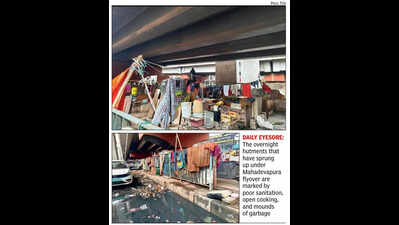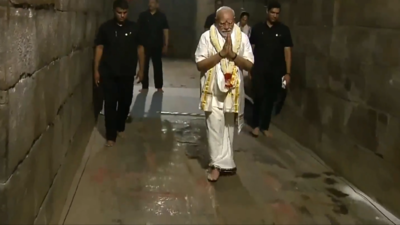Plastic huts beside high-rises expose Bengaluru’s IT zone dual reality | Bengaluru News

Bengaluru: Lined with towering glass-and-steel high-rises that house over 500 major companies in 26 tech parks, the 17km Outer Ring Road (ORR) stretch between Central Silk Board and KR Pura is supposed to be a reflection of modern opulence. But what has sprung up under the Mahadevapura flyover in the past few weeks has left even ordinary motorists shell-shocked: makeshift shelters, built from plastic sheets and wooden poles, in the middle of the road!These overnight hutments — marked by poor sanitation, open cooking, and mounds of garbage — are drawing criticism for the city’s tech crowd as they spoil the visual and civic appeal of a key IT zone. The unauthorised settlement is also a pointer to how civic officials have turned a blind eye towards the problem of squatters. “We aren’t against the poor and the helpless, but that doesn’t mean they should be allowed to pitch tents in front of tech parks. Imagine watching people taking bath or drying clothes under the flyover, barely a few feet from offices. We cut a sorry figure in front of our colleagues or bosses who come from abroad. Something has to be done to make ORR more presentable instead of adding to the misery,” rued Dinesh M, a data analyst with a fintech company near Doddanekundi on ORR. Acting on the information, a TOI team visited the spot and learnt that a few migrant families from Telangana’s Nizamabad area have set up homes under the flyover. “We earn at least Rs 500 per person for any work we find in Bengaluru, which is much more than what we earn back home. However, we can’t afford to rent a house with our earnings, and since we don’t stay here for long stretches, we manage by living under flyovers and moving as needed,” said Raju, one of the migrants.Their makeshift homes are built with used clothes and discarded sofas. They have also created makeshift bathroom spaces where women and children bathe and change clothes, with wastewater flowing on to the roads, creating unhygienic conditions. The migrants have set up temporary kitchens, cooking with wood collected from discarded furniture. They fetch water from nearby construction sites for cooking, bathing, and drinking. For defecation and urination, they use a public toilet less than 100 metres away. However, they have built separate bathing spaces in their huts to avoid the Rs 10 daily fee for using public facilities. “With the little money we earn, we can’t afford to spend Rs 10 every day per person, so we have a small, cramped bathing space in our huts. Poverty forces us to adapt,” said Lakshmi, another resident.When asked by TOI what they would do if asked to leave, Akshata replied: “We don’t disturb anyone, so they allow us to stay here. If we are asked to leave, we will return to our hometown and come back when there’s work. It’s tough, but we have no other option.” While police and civic agencies are yet to act, motorists and local residents feel such settlements shouldn’t be allowed near tech parks. “Bengaluru is a global city, it shouldn’t be synonymous with slums. Even our lives are affected,” said Narayan Reddy, a realtor and resident of Karthik Nagar. Locals have urged the civic authority to take action against these illegal land occupations. When contacted, BBMP special commissioner (welfare and health) Suralkal Vikas Kishore said: “The only way to avoid such slums is to make them move to BBMP shelter homes. Currently, there are 40+ shelter homes, and they are not sufficient as the city sees a massive moving crowd. We’re contemplating increasing the number of shelter homes to house such people.”






